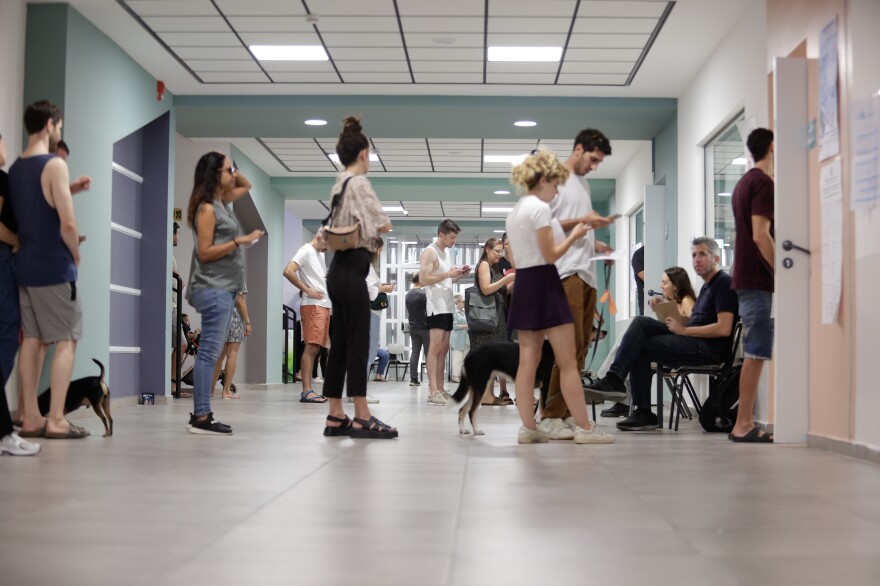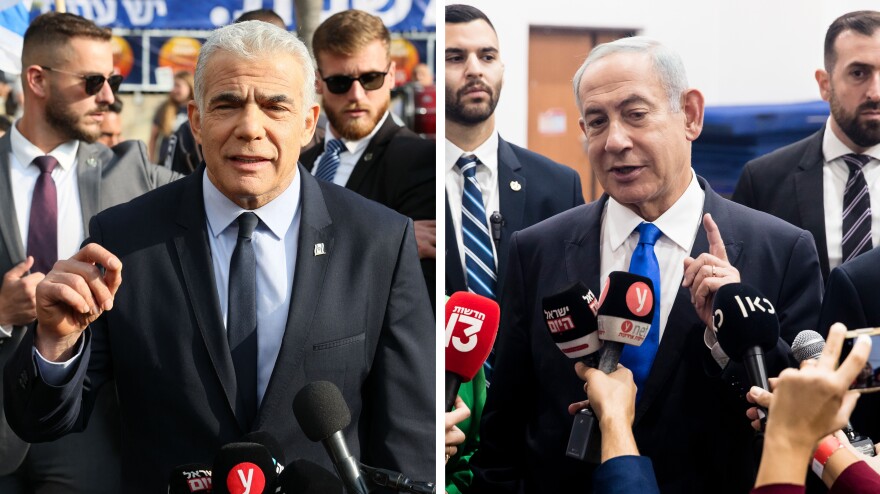Updated November 1, 2022 at 6:42 PM ET
JERUSALEM — Voting ended Tuesday night after Israelis went to the polls in their fifth election in 3 1/2 years.
Initial exit polls are projecting a slim parliamentary majority for former Prime Minister Benjamin Netanyahu and his far-right and religious allies.
But as the votes are counted, Netanyahu could lose that advantage and a stalemate may emerge between Netanyahu's allies and parties opposed to Netanyahu — especially if Balad, a small nationalist Arab party, manages to get enough votes to enter parliament and tip the scales away from Netanyahu's bloc.
"It's not over. It depends on whether Balad will make it," Likud lawmaker Miki Zohar told Israeli Channel 13.
Israeli television exit polls projected Netanyahu and his allies winning a one- or two-seat majority in the 120-seat parliament, which would unseat centrist Prime Minister Yair Lapid.
Israeli election officials said voter turnout was 71.3%.

Israel's political map is split down the middle between parties that want populist nationalist icon Netanyahu in power, and parties that say the polarizing figure on trial for corruption is unfit to serve. A diverse coalition unseated Netanyahu last year, but it broke up this year over ideological differences.
If no candidate can form a 61-lawmaker majority in the 120-member parliament, Lapid will remain a caretaker leader and elections will be held yet again. Polls show no easy path to victory for Lapid or other anti-Netanyahu candidates.
Lapid campaigned with center-left allies, arguing he would keep right-wing extremism at bay. Netanyahu promised to bring Israelis a sense of security, after Palestinians killed 25 Israeli civilians and soldiers this year. Israeli troops have killed more than 130 Palestinian militants and civilians during the same period, the deadliest toll in several years.
If Netanyahu wins, he could form a government with religious and far-right partners, including parties that promote hostile policies against Palestinian Arab citizens, anti-LGBTQ sentiment and proposals to weaken the independence of the judiciary — which could help Netanyahu escape conviction in his corruption trial.
"The right side don't like gay people, don't like Arabs," says Liron Gur, a gay Israeli voter. "I believe if they will be the power, my life will be very bad."
At a polling station in Jerusalem where Netanyahu cast his ballot, some right-wing voters said they were abandoning support this time for Netanyahu and his right-wing allies.
"We don't believe him," says cab driver Udi Avni, who for the first time is not voting for Netanyahu and says he'll cast his vote for the center-left Labor Party instead. "He just care[s] about himself. About his trial ... to be free."
"It's too right-wing at the moment," says Reuben Rotenberg about the main religious party running for election.
It's a tight race. It could take weeks before there is a clear winner, as parties negotiate to form a parliamentary majority.
Natan Odenheimer contributed to this story from Jerusalem.
Copyright 2022 NPR. To see more, visit https://www.npr.org.



